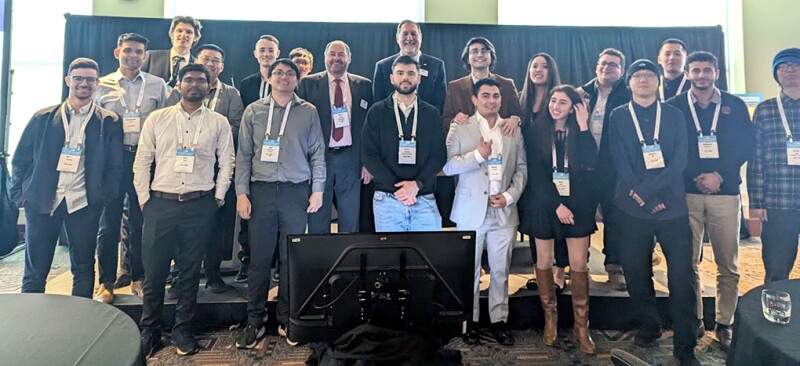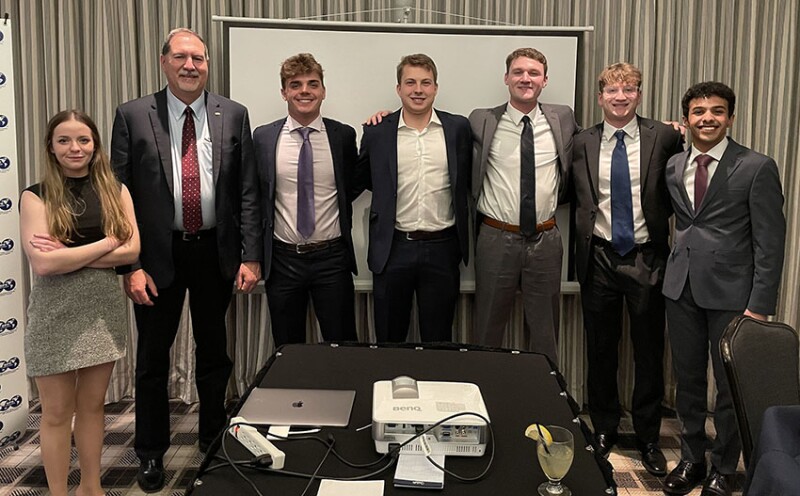Editor’s Note: This is a summary of the May episode of the President’s podcast. We encourage you to listen to the episode to hear the full conversation.
In this podcast episode, I am joined by Jennifer Miskimins, department head of petroleum engineering at the Colorado School of Mines, to discuss the importance of supporting universities and students through the challenges and opportunities facing the industry. I chose Jennifer to be part of this episode because of her extensive experience in both academia and the industry. This episode aims to delve into the status of petroleum engineering departments and the importance of students in shaping the industry’s future. I emphasize the collaborative effort required from universities, SPE, and its members to attract the next generation to the field.
Our conversation revolves around the importance of addressing the challenges faced by petroleum engineering programs and attracting students to the field. I explain that the SPE Board of Directors recognizes the significance of universities, students, and faculty in the industry, including naming them as core constituencies in SPE’s Strategic Plan.
Attracting the next generation is one of the top concerns among SPE members. Young professionals and students play a vital role in driving innovation and addressing future challenges, emphasizing the need for a full pipeline of talent to sustain the industry’s progress.
I believe that students are essential for shaping the future of energy and fulfilling humanity’s needs, as they aspire to make a meaningful impact in the world. We need the next technical breakthroughs, most of which will come from the students in university today. They want to feel like they’re making a difference in the world.
Jennifer adds, “What I frequently hear from students is yes, they want a long-term career but making a difference is very important. And they can do so. So hopefully, we can get more students coming our direction.”
Although enrollment in petroleum engineering programs has fluctuated due to industry downturns and external factors like the COVID-19 pandemic, recent data suggests a modest increase in undergraduate enrollment, indicating a potential upswing. There are challenges such as the industry’s public image, perception of job stability, and declining enrollment in STEM education. Addressing these challenges requires reframing the narrative around the energy “transition” to one of “expansion” and highlighting the long-term career opportunities in the industry.

We share insights into how universities are incorporating diverse energy-related topics into their curriculum, offering electives on emerging technologies, and engaging with industry professionals to provide students with real-world insights and opportunities. We also emphasize the role of faculty advisors and industry support in sustaining student chapters of organizations like SPE, which play a crucial role in bridging the gap between academia and industry. We further point out the critical role SPE members play in supporting students and universities through mentorship, financial support, and speaking engagements. Active involvement in student chapters helps bridge the gap between academia and industry.
I mention Lloyd Heinze, a retired Texas Tech professor who conducts an annual enrollment survey primarily focused on the US but also includes some international schools. His data dating back to 1970 indicates that enrollment trends typically lag industry changes by about 4 to 5 years. Until 2015–2016, engineering department enrollments were steadily growing, but a downturn in the industry in 2014–15 and the subsequent impact of the pandemic led to significant drops. However, recent data suggests a possible bottoming out and even modest increases, with undergraduate enrollment in the US showing an average increase of 15 to 20% this year compared to last year. Similarly, SPE saw a significant increase of 13% in student membership in 2023, marking the first increase since 2015. This growth is spread across regions, indicating a potential overall upswing in engineering programs despite varying regional conditions. The pace and extent of this upswing remain uncertain.
The changing demographics and perceptions within the engineering field require attracting new talent to address technology-driven challenges. Jennifer and I discuss how universities are addressing these challenges, noting that approaches vary by institution and region. Some departments have merged with others or changed their names to reflect broader geoscience or subsurface engineering focuses. While some programs have closed, many schools believe petroleum engineering is here to stay but are adapting by offering new electives on topics like carbon storage and hydrogen. Additionally, universities are integrating energy-related topics into existing courses and reaching out to high schools to emphasize the importance of the energy industry. I highlight that membership in organizations like SPE is open to individuals from various backgrounds, not just petroleum engineers.
We discuss the diverse approaches taken by schools and programs to address challenges in the engineering field, emphasizing that there’s no one-size-fits-all solution. I stress the impact of alumni and professionals engaging with students, sharing career experiences, providing financial support through scholarships, research funding, and industry involvement. I encourage members to support their local sections, participate as speakers or mentors, and engage with university chapters or advisory boards.

I detailed the process of starting a new student chapter and emphasized that a petroleum engineering department is not required to establish a chapter, citing examples of universities with related energy programs.
The key requirements for starting a chapter include having at least 25 students and a faculty advisor who is an SPE member. A strong faculty advisor is crucial for the chapter’s continuity and success. The role of a sponsoring SPE section, required to start a chapter, is crucial in providing support and guidance to the chapter.
We discuss the importance of student involvement at the university level, addressing a common question about why students should participate in extracurricular activities like joining SPE. My experience was initially joining SPE while in university primarily for my resume, but I encourage students to go beyond this. The benefits of involvement are learning teamwork, achieving goals, and gaining a sense of accomplishment.
Networking is important in one’s career and SPE membership is free for students, thanks to support from organizations like Chevron. Overall, I advocate for students to engage in extracurricular activities to develop into more well-rounded individuals beyond just academics.
There are benefits that professionals gain from engaging with and supporting students at the university level. It is important to invest in students and universities as they represent future talent pools for companies. A healthy student chapter helps maintain a strong pipeline of prospective employees and fosters early connections between students and the industry.
There are also personal fulfillment and professional growth opportunities that professionals, especially young professionals, can experience by interacting with students. Engaging with students allows professionals to develop presentation and soft skills in a supportive environment, impact students’ careers, and demonstrate the importance of giving back to the next generation. Supporting students and universities contributes to the sustainability and longevity of the energy industry, which is crucial for addressing global energy needs.

Next Month Sneak Peek
Next month I plan to delve deeper into soft skills and the significance of volunteering with SPE, highlighting how these aspects contribute to shaping the energy future. I have asked Susan Howes, president at Subsurface Consultants & Associates LLC, to join me in the discussion.


